Track When You're Featured in ChatGPT and Google AI Overviews
Monitor real-time citations from ChatGPT, Google AI Overviews, Perplexity, Claude, and other AI assistants. See which pages they access, track citation patterns, and measure how AI visibility drives traffic to your site.
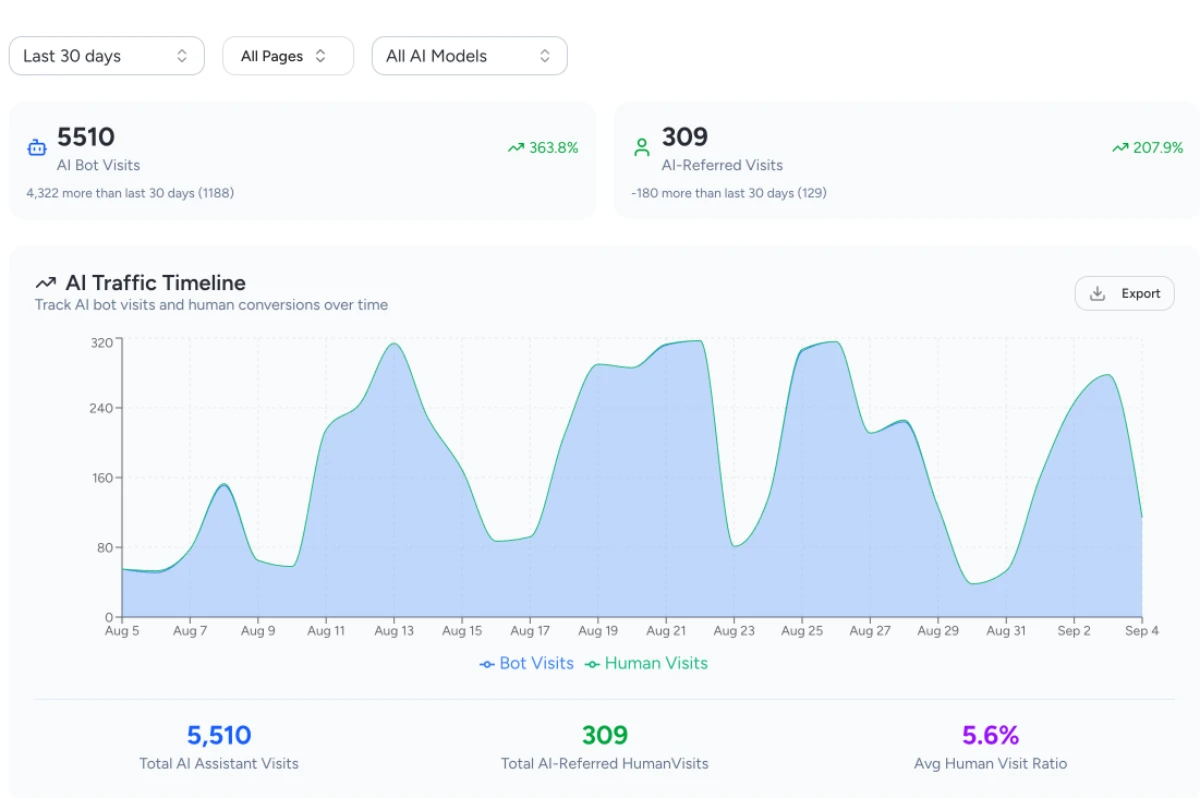
Everything You Need to Dominate AI Search
Complete visibility and tracking tools to help you get featured accurately and often in ChatGPT and Google AI Overviews.
Track Citations to Conversions
Monitor your complete AI visibility funnel: from when ChatGPT or Google AI Overviews cite your brand, to clickthroughs, all the way to purchase conversions.
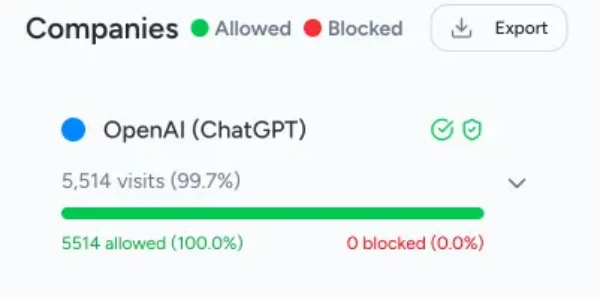
Send AI Citation Data to Your Analytics
Forward AI visibility data to Google Analytics, PostHog, and other tools for a complete view of how AI search drives traffic to your site.
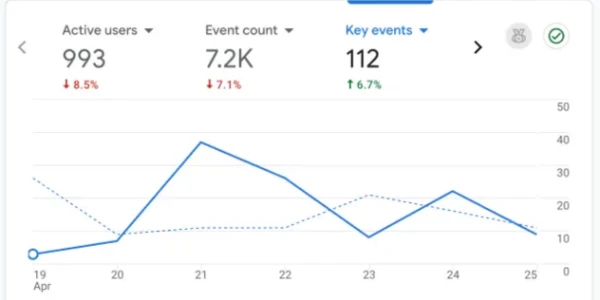
Understand Why You're Being Cited
Spyglasses is the only platform that shows not just how often ChatGPT and other AI cite your brand, but the search intent behind each citation.
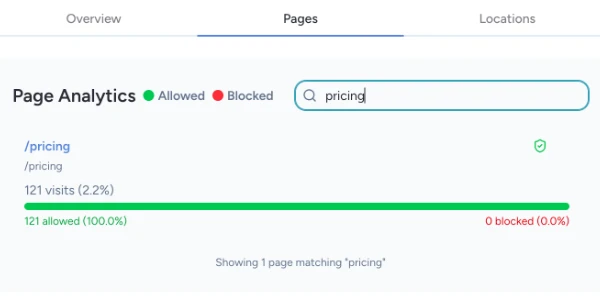
Monitor AI and Search Engine Indexing
Track when ChatGPT, Google AI Overviews, and search engines re-index your content so you can optimize your AI visibility strategy.
Control AI Access to Your Content
Block AI model trainers with one click while keeping your content accessible to ChatGPT and Google AI Overviews for citations.
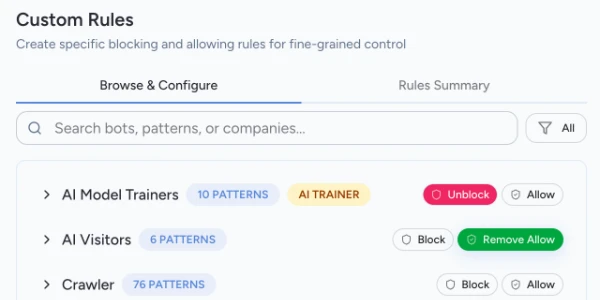
Why Choose Spyglasses
The only platform that helps you get featured accurately and often in ChatGPT, Google AI Overviews, and other AI search results.
See Why AI Platforms Cite You
The only platform that reveals not just when ChatGPT and Google AI Overviews cite your brand, but the user search intent behind each citation.
Works with Nearly Every Web Platform
One-click install for WordPress, support for Cloudflare, Webflow, and open source packages for python, ruby, and Next.js.
Integrates with Your Analytics Stack
Forward AI visibility and citation data to Google Analytics, PostHog, and other tools you already use for a complete picture of how AI drives traffic.
Tracks Citations from All Major AI Platforms
Monitor citations from ChatGPT, Google AI Overviews, Perplexity, Claude, Gemini, and 600+ other AI platforms. Also track when Google and other search engines re-index your content.
Your Content, Used How You Intend
Block AI model trainers with one click while keeping your content accessible to ChatGPT and Google AI Overviews for beneficial citations.
Start tracking your AI visibility today
Join thousands of brands using Spyglasses to get featured accurately and often in ChatGPT and Google AI Overviews.
No credit card required • Track AI citations • Setup in under 5 minutes
Frequently Asked Questions
Everything you need to know about tracking your AI visibility and citations.
What is AI Traffic Analytics?
AI Traffic Analytics is a technique for tracking and analyzing visits from AI assistants like ChatGPT, Claude, and Perplexity to websites. These AI visits typically don't use JavaScript, making them invisible to traditional analytics tools like Google Analytics. The method captures data on how AI systems access and interact with web content.
How does AI influence website traffic?
AI assistants like ChatGPT, Claude, and Perplexity generate website traffic by citing and linking to web pages when answering user questions. This creates a new traffic source beyond traditional search engines. AI platforms crawl websites to gather information for their responses, then direct users to relevant pages through citations and clickthroughs, potentially leading to conversions.
How can I see AI traffic in Google Analytics?
AI traffic typically doesn't appear in standard Google Analytics because AI assistants don't use JavaScript like traditional browsers. Specialized analytics platforms can send AI visit data to Google Analytics using Measurement Protocol, which allows server-side tracking to capture these visits that would otherwise be invisible in your analytics dashboard.
How can I measure AI traffic on my website?
Measuring AI traffic requires specialized analytics platforms that can identify visits from AI assistants like ChatGPT, Claude, and Perplexity. These platforms track bot user agents and crawling patterns that traditional analytics miss. They can integrate with existing analytics tools to provide comprehensive traffic data including citation frequency, clickthrough rates, and conversion tracking.
How can I track ChatGPT traffic?
ChatGPT traffic can be tracked by identifying its specific user agent and crawling patterns when it accesses websites to gather information for responses. Specialized analytics platforms monitor these visits and can distinguish ChatGPT traffic from other AI assistants. The tracking covers both when ChatGPT crawls content and when users click through from ChatGPT responses to websites.
Can ChatGPT be monitored for website analysis?
Yes, ChatGPT activity can be monitored through specialized analytics that track when it accesses website content and how it uses that content in responses. This monitoring reveals citation frequency, content usage patterns, and resulting user traffic. Website owners can analyze which content ChatGPT references most and optimize accordingly for better AI visibility and traffic generation.
What is bot traffic in Google Analytics?
Bot traffic in Google Analytics refers to visits from automated programs, crawlers, and AI assistants rather than human users. This includes search engine bots, social media crawlers, and AI platforms like ChatGPT. Traditional analytics often miss AI bot visits because they don't execute JavaScript. Specialized tracking methods can capture this previously invisible traffic for analysis.
How do I integrate third-party analytics with Google Analytics?
Third-party analytics integration with Google Analytics typically involves using Measurement Protocol, webhooks, or API connections to send data between platforms. The specific method depends on the third-party tool's capabilities and your data requirements. Many platforms offer built-in Google Analytics integrations, while custom implementations may require developer setup using Google's tracking codes or server-side tracking methods.
What are the best AI tools to track website visitors?
AI traffic analytics tools track visits from AI assistants like ChatGPT, Claude, and Perplexity, which traditional analytics miss because they don't use JavaScript. These platforms monitor over 600 AI crawlers, provide citation analysis, and integrate with existing analytics tools. Key features include traffic intent analysis, bot blocking capabilities, and comprehensive reporting on how AI platforms access and cite your content.
What AI tools can track citations for SEO automatically?
AI citation tracking tools monitor when content gets referenced by AI assistants like ChatGPT, Claude, and Perplexity. These platforms analyze AI responses to identify content citations, track citation frequency, and provide insights into which pages receive mentions. Advanced tools can correlate citations with traffic patterns and measure the SEO impact of AI-generated recommendations.
What are effective methods for conversion tracking using AI analytics?
AI analytics conversion tracking involves monitoring the complete user journey from AI citations to final conversions. This includes tracking clickthroughs from AI responses, measuring downstream actions, and integrating with existing analytics platforms through APIs. Effective methods use measurement protocols to capture AI-originated traffic and correlate it with purchase data or lead generation metrics.